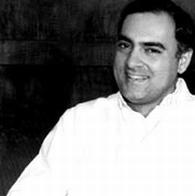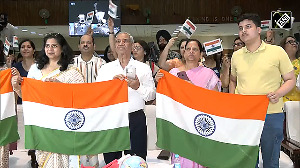 The Centre on Thursday moved the Supreme Court, seeking a review of its judgment commuting the death sentence to life imprisonment of three convicts in the Rajiv Gandhi assassination case, on the ground of delay in deciding their mercy plea.
The Centre on Thursday moved the Supreme Court, seeking a review of its judgment commuting the death sentence to life imprisonment of three convicts in the Rajiv Gandhi assassination case, on the ground of delay in deciding their mercy plea.
The review petition was filed hours after the apex court blocked the decision of the Tamil Nadu government to release Murugan, Santhan and Perarivalan, who had got relief on Tuesday from an apex court bench headed by Chief Justice P Sathasivam.
In a hurriedly-filed petition, the Centre contended that the three-judge bench, also comprising Justices Ranjan Gogoi and S K Singh, did not consider the merits of the case and also ventured into the domain of government by commuting the death sentence.
It further contended that the February 18 judgment was passed without jurisdiction by the three-judge bench, instead of a larger bench of five judges, as the case involved substantial interpretation of law and provisions of the constitution.
“It is respectfully submitted that the impugned judgment is patently illegal, suffers from errors apparent on the face of the record and flies in the face of well-established principles of law laid down by this Court and contained in the Constitution and other statutes," the petition said.
"It is submitted that in the present case, the issue raised was that of the commutation of the death sentence to life imprisonment on the ground of delay, which allegedly attracted Article 21 in favour of the convicts. Therefore, it involved a substantial issue of interpretation of the constitution and ought to have been heard by a bench of five judges, as mandated by the Constitution," the petition said.
The Centre contended that the apex court interfered with the order of the President, rejecting the plea for mercy without its jurisdiction.
"Furthermore, it is submitted that the interference of this court with the merits of the order of the rejection issued by the President, in exercise of the power conferred by Article 72, is without jurisdiction.
"It is submitted that once the President had, in exercise of his power under Article 72, rejected the mercy petition, this Court only has a limited power, under judicial review, to disturb the order of the President," the petition said.
The Centre said if the apex court was of the opinion that there has not been a proper consideration of the mercy petition, the same ought to be remitted back to the President for reconsideration.
Alternatively, if the issue raised was with respect to delay, as in the present case, this Court ought to have referred the matter to the President requesting an expeditious disposal of the petition, it said.
The Centre said the President is not required to give any grounds and the only aspects required to be looked into by the President are those with respect to malafides, political expediency, extraneous factors, non-applicability of mind to the material available, undue haste, etc, which are all the negative aspects.
The petition said the judgment commuting the death sentence to life imprisonment of three convicts does not properly consider the arguments put forth by the Centre, which amounts to an error apparent on the face of the record as the delay was explained.
The Centre said delay which causes torture, is agonising, and has a dehumanising effect, which can be one ground to be considered when considering the issue of commutation.
However, the judgment commuting the sentence in this case goes contrary to the provisions of the Code of Criminal Procedure, 1973 which leaves this to the jurisdiction of the appropriate government -- the central government -- as per Section 432, 433 and 435.
"It is submitted that the court ought to have passed an effective order which would have prevented the release and setting at large of the convicts," the Centre said.




.jpg)





